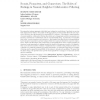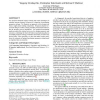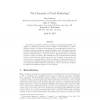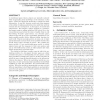143
click to vote
SIGECOM
2006
ACM
15 years 8 months ago
2006
ACM
Games may be represented in many different ways, and different representations of games affect the complexity of problems associated with games, such as finding a Nash equilib...
SIGECOM
2006
ACM
15 years 8 months ago
2006
ACM
106
Voted
SIGECOM
2006
ACM
15 years 8 months ago
2006
ACM
Our proposed methods employ learning and search techniques to estimate outcome features of interest as a function of mechanism parameter settings. We illustrate our approach with ...
SIGECOM
2006
ACM
15 years 8 months ago
2006
ACM
113
click to vote
SIGECOM
2006
ACM
15 years 8 months ago
2006
ACM
Braess’s Paradox is the counterintuitive but well-known fact that removing edges from a network with “selfish routing” can decrease the latency incurred by traffic in an eq...
137
click to vote
SIGECOM
2006
ACM
15 years 8 months ago
2006
ACM
The global wave of ICT development has become a strong driving force in almost every aspect of human endeavor. Electronic commerce (e-commerce) is fast gaining a prominent place i...
105
click to vote
SIGECOM
2006
ACM
15 years 8 months ago
2006
ACM
We present an analysis of a person-to-person recommendation network, consisting of 4 million people who made 16 million recommendations on half a million products. We observe the ...
131
click to vote
SIGECOM
2006
ACM
15 years 8 months ago
2006
ACM
In traditional game theory, players are typically endowed with exogenously given knowledge of the structure of the game—either full omniscient knowledge or partial but fixed in...
133
click to vote
SIGECOM
2006
ACM
15 years 8 months ago
2006
ACM
Structured peer-to-peer systems allow to administer large volumes of data. Several peers collaborate to generate a query result. Analyses of unstructured peer-to-peer systems, nam...
SIGECOM
2006
ACM
15 years 8 months ago
2006
ACM




